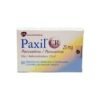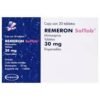What is phenelzine?
phenelzine
Get Now
Phenelzine works by inhibiting the enzyme monoamine oxidase (MAO), which is responsible for breaking down neurotransmitters such as serotonin, norepinephrine, and dopamine. By blocking this enzyme, phenelzine increases the concentration of these neurotransmitters in the synaptic cleft, enhancing mood and emotional stability.
Indications
Phenelzine is primarily indicated for:
- Major Depressive Disorder: Particularly effective for patients who have not responded well to other antidepressants.
- Anxiety Disorders: Including generalized anxiety disorder and social anxiety disorder.
- Other Conditions: Sometimes used off-label for conditions like panic disorder and certain types of phobias.
Dosage and Administration
Phenelzine is typically taken orally, and the dosage varies based on individual patient needs and responses. Treatment usually begins with a low dose to minimize side effects, which can include dizziness, weight gain, dry mouth, and insomnia. It’s crucial for patients to follow their healthcare provider’s instructions closely.
Dietary Restrictions
One of the significant considerations for patients taking phenelzine is the need to avoid foods high in tyramine. Tyramine is an amino acid that can cause dangerously high blood pressure when consumed in conjunction with MAOIs. Foods to avoid include:
- Aged cheeses
- Processed meats
- Fermented foods
- Certain alcoholic beverages (especially red wine and beer)
Patients must also be cautious with medications, as many over-the-counter and prescription drugs can interact adversely with phenelzine.
Side Effects
While phenelzine can be effective, it also carries potential side effects, which can include:
- Hypotension (low blood pressure)
- Drowsiness or sedation
- Insomnia
- Weight gain
- Sexual dysfunction
In rare cases, it may lead to hypertensive crisis, a serious condition that can arise from dietary indiscretion or drug interactions.
Monitoring and Management
Patients on phenelzine require regular monitoring to assess effectiveness and watch for side effects. Healthcare providers typically schedule follow-up appointments to discuss any concerns and make necessary adjustments to the treatment plan.
Conclusion
Phenelzine is a valuable treatment option for certain individuals dealing with major depression and anxiety disorders. Its unique mechanism of action and effectiveness in treatment-resistant cases make it an important consideration in psychiatric care. However, due to its dietary restrictions and potential side effects, it requires careful management and patient education. As always, individuals should consult their healthcare providers to determine the most appropriate treatment options for their specific conditions.



